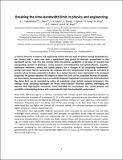Breaking Lorentz reciprocity to overcome the time-bandwidth limit in physics and engineering
Abstract
A century-old tenet in physics and engineering asserts that any type of system, having bandwidth Δω, can interact with a wave over only a constrained time period Δt inversely proportional to the bandwidth (Δt·Δω ~ 2π). This law severely limits the generic capabilities of all types of resonant and wave-guiding systems in photonics, cavity quantum electrodynamics and optomechanics, acoustics, continuum mechanics, and atomic and optical physics but is thought to be completely fundamental, arising from basic Fourier reciprocity. We propose that this “fundamental” limit can be overcome in systems where Lorentz reciprocity is broken. As a system becomes more asymmetric in its transport properties, the degree to which the limit can be surpassed becomes greater. By way of example, we theoretically demonstrate how, in an astutely designed magnetized semiconductor heterostructure, the above limit can be exceeded by orders of magnitude by using realistic material parameters. Our findings revise prevailing paradigms for linear, time-invariant resonant systems, challenging the doctrine that high-quality resonances must invariably be narrowband and providing the possibility of developing devices with unprecedentedly high time-bandwidth performance.
Citation
Tsakmakidis , K L , Shen , L , Schulz , S A , Zheng , X , Upham , J , Deng , X , Altug , H , Vakakis , A F & Boyd , R W 2017 , ' Breaking Lorentz reciprocity to overcome the time-bandwidth limit in physics and engineering ' , Science , vol. 356 , no. 6344 , pp. 1260-1264 . https://doi.org/10.1126/science.aam6662
Publication
Science
Status
Peer reviewed
ISSN
0036-8075Type
Journal article
Description
K.L.T. gratefully acknowledges the support of the Eugen Lommel fellowship of the Max Planck Institute for the Science of Light (Erlangen) and R.W.B. the Canada Excellence Research Chairs Program. H.A. and K.L.T. supported by European Commission Horizon 2020 (grant no. FETOPEN-737071), ULTRA-CHIRAL Project. L.S. supported by National Natural Science Foundation of China grant no. 61372005 and key project grant no. 41331070Collections
Items in the St Andrews Research Repository are protected by copyright, with all rights reserved, unless otherwise indicated.

